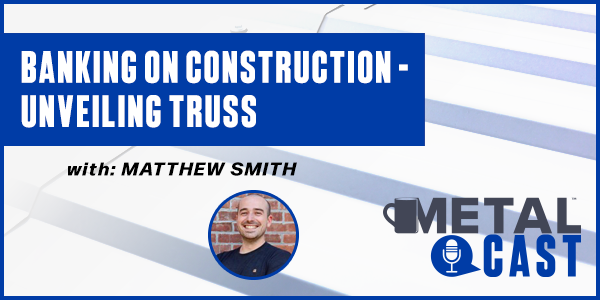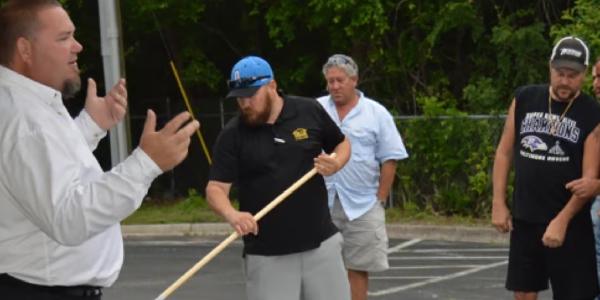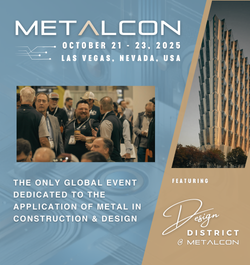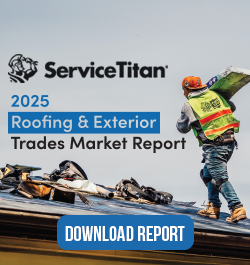Banking on construction - Unveiling Truss - PODCAST TRANSCRIPT
January 23, 2024 at 12:00 p.m.Editor's note: The following is the transcript of a live interview with Matthew Smith from Truss. You can Read the interview below, Listen to the podcast or Watch the video.
Karen Edwards: Hello and welcome to MetalCast by MetalCoffeeShop. My name is Karen Edwards, and today we're going to be talking about banking and payment solutions for contractors and the construction industry. And joining me for this episode is Matthew Smith from Truss, which is a new cutting edge solution for contractors. Welcome, Matthew.
Matthew Smith: Hey, Karen. Thanks so much for having me. Happy to be here.
Karen Edwards: Yeah. Could you introduce yourself, tell our listeners a little bit about you?
Matthew Smith: Yeah. I'm Matthew. I'm the CEO and Co-founder of Truss. At Truss, we're building a banking solution for the construction industry. A little bit about me, I'm actually a software engineer, so I'm not actually a banker. I guess I am now, but my background is in software engineering and I honestly just love building solutions. I mean, different from our clients. Our clients build buildings and things in the real world, whereas I kind of grew up and have learned how to build things digitally. So that's what I've been focused on.
Actually, one interesting tidbit about when we first started is my co-founder and I, Nick, we both built most of the early code, just the two of us. So definitely... I don't code as much anymore. But yeah, it's kind of great to see where things have gone. Yeah, that's my background. So not just a banker, which is I think one of our secret advantages.
Karen Edwards: Well, we'll talk more about that then, but when I think of banking, I think of, I got to go to my bank. They work nine to five, writing checks, making deposits. What is Truss? What do you do for contractors?
Matthew Smith: Yeah, so I guess this is maybe less known, but in the tech world, most companies... I would say almost all companies in the tech world do not use traditional banking. So there's a lot of tools now where folks are using virtual card programs, digital banking. What that's done for the tech industry is that it's made us way more efficient. Our cost of transactions and speed of transactions has improved. Our cost of accounting has improved. It's really accelerated businesses by having digital solutions for their banking, payments, card programs.
And that's kind of left the blue collar industry kind of in the dark for a bit here. What we've seen is that in the blue collar industry, in construction, folks have not adopted those solutions. They're actually missing out on a lot of those key innovations that have accelerated other industries in the US.
So our goal is to create a solution that kind of brings all of those innovations to the construction industry that are already being taken advantage of by the tech industry. I feel like it's a big responsibility because all these folks who, they're still using their local credit union, they don't really understand that there's a solution that's 10 years ahead of that or 20 years ahead of that already out in the market. And we're trying to get it to them.
Karen Edwards: So we're talking about maybe a contractor who sends an invoice in the mail.
Matthew Smith: Correct.
Karen Edwards: And the customer has to write a check and mail it in.
Matthew Smith: A lot of it is to do with checks, but another side to it is, let's say, company credit cards. If you're a construction company, oftentimes you're sharing one or two credit cards with your staff and you have this big security vulnerability and you're not tracking those expenses properly. With our system, you can issue virtual cards to all your staff or physical cards to all your staff. You can, from a click of a button on your cell phone, control how much that staff member can spend. You can see what they've spent on. It sends them reminders to upload receipts and it all pushes to your accounting system. It's like 20 years advance or 10 years advance from just like, "Oh, I'm walking around with this shared credit card and then bringing in receipts into the office," but then you're paying extra money to this bookkeeper to have to manually enter all this stuff into your system, and it's just so far removed.
I mean, the check thing is always going to be a conversation because even our... We support depositing checks, so you can deposit checks in the field with us. I mean, God, we've been trying to get people to stop using checks, but it just isn't happening. So there's other ways that you can still use checks, but make it more efficient. For example, you can give your field staff access to depositing checks so they can deposit in the field, then drop it off in the office, so the processing starts much faster. So you get access to the funds faster rather than them picking it up, dropping it off the office. The office person then has to either deposit it mobilely or walk it into the bank once a week kind of thing. We kind of remove that delay for the money to start moving.
Karen Edwards: Okay. I have a question regarding the staff that do have credit cards. If they make a purchase, are they able to take that app or whatever they're using on their phone and take a picture of their receipt so that we're not scrambling to track down receipts at the end of the month, right?
Matthew Smith: Yeah. Of course. So as soon as a staff member makes a purchase, they actually get a text message with a link and they click that link, they upload the receipt and then that staff member can add notes, and then they can also tag projects. So let's say they're buying materials for multiple projects. They could tag those multiple projects and maybe put in the notes, "Hey, this is for this project." And we're actually working on something that's going to scrape the receipt to be able to pull out individual line items. So let's say I'm buying one set of materials for one job and another set of materials for another job on the same purchase. I can actually split those two expenses in my accounting system automatically to assign them to different clients.
Karen Edwards: Nice. That's really, really nice.
Matthew Smith: Yeah.
Karen Edwards: So I'm curious then about integration because contractors are typically using some sort of an accounting program.
Matthew Smith: Mostly. A lot of QuickBooks Desktop is what I see.
Karen Edwards: Yes, yes.
Matthew Smith: So today we integrate with QuickBooks Online. QuickBooks Desktop is a really big challenge because it's locally hosted. What that means is that it's not in the cloud, as people say, so it makes it really challenging for us to integrate with. But we are working on a lot of integration. Right now, we're actually in the works of finding a partner that's going to help us integrate into a whole bunch of accounting systems in one swing as opposed to us just building each individually. But right now, we're fully integrated into QuickBooks Online.
Karen Edwards: Online.
Matthew Smith: And we make it easy to export your data. So if you want to... Basically, you can export all your data to CSV and then upload that to QuickBooks Desktop and that's how we do the integration today. It's not as efficient as a direct integration, obviously, but it is in the works, those other integrations.
Karen Edwards: You're still not manually entering information, so you still are taking time.
Matthew Smith: Correct. Yeah, absolutely.
Karen Edwards: Okay. I want to know the story behind Truss. You mentioned that tech has been using digital banking for a long time. How did you identify and recognize the need for construction, that they had been left behind and targeting them? How did this come to be?
Matthew Smith: Yeah. The friends I had growing up, actually I was the only one of them to go to university and study software engineering. The rest of them actually all work in the trade. Well, one of my best friends owns a contracting company. He was one of our first customers. And the other friend owns an independent hardwood pouring company. Really, it came about through them, us sitting around having beers on a Friday and me learning how to code and then complaining about their issues over a beer and me being like, "Okay, I can build stuff to solve these problems." And that's kind of how we got onto it.
I mean, how the company started in the first place, we actually started in Canada. I'm Canadian, and we built a B2B payment solution in Canada and actually built that up to be quite big, and then ran into all these roadblocks with the banking system in Canada. What we found was that in the US, banking is actually much more open. It was much easier for us to come to the US and start a digital bank than it was in Canada.So we said, "You know what? We've done all this work in Canada, but let's go to the states and build the actual solution we want to build with all of this great banking infrastructure in the background." And I'm sorry to the Canadian customers. They don't get to take advantage of all those things.
Karen Edwards: Not yet.
Matthew Smith: But yeah. I mean, obviously there's more to unpack in the story there, Karen, but that would be a whole 45 minute podcast of how we did that transition.
Karen Edwards: Oh. Yeah, we'll do that another day.
Matthew Smith: We'll do that another day.
Karen Edwards: I'm surprised that Canada was more difficult than the US. I am used to things being the other around.
Matthew Smith: Oh, gosh. No. I mean, Canada is a land... I mean, well, that's going to tangent us, but Canada, I call it the land of monopolies. The big banks there, they have those five big banks, and they don't like it when a new neobank comes in and tries to take the market. So it's much more difficult to enter, whereas the US is very competitive. So for us to enter the market here, it's fantastic. We find banking partners or folks that are excited to work with us as opposed to like, "Oh, no, they're going to take our business."
Karen Edwards: Right, right. I have questions that probably weren't on your list that we sent to you just as we're talking that are coming up.
Matthew Smith: That's okay.
Karen Edwards: So I hope these aren't curve balls. So traditional banking is backed by the FDIC. Your money is insured up to a certain amount. When I hear digital banking, I get a little scared, and I think because there's crypto stuff out there and there's a lot of things happening.\
Matthew Smith: Oh, yeah.
Karen Edwards: And I don't understand that. Explain to me where my money is and how it's protected.
Matthew Smith: Truss is not a bank. We provide banking. And the difference is that we sit on top of a bank partner that provides the security of those deposits with the FDIC. So we actually have $2.5 million of FDIC insurance on every account, and that's provided by our bank partner Thread Bank, who's the bank partner sitting on top. So Imagine Thread Bank is this provider of the banking license, the insurance. They deal with the FDIC, the regulation, and we are the innovators sitting on top of them, and we are able to build all this amazing software and innovation on top of that. So think of it like your local community bank is good at the banking and security part of like, "Hey, we dealt with the FDIC, we dealt with the regulation." But they're not good at building the software.
You go to their website, you log into their thing, you're like, "Oh my God, was this built in the nineties? What's going on here?" So what's so amazing about this is that we can take advantage of that local community bank like security and regulation, but then add on the digital innovation on top of it to create a secure system for digital banking. I'm not a crypto advocate. I don't have crypto. I actually don't think it's a good thing to put your money in crypto. I believe in the need for regulation and security and insurance. I mean, these are people's livelihoods here, so it's a big responsibility. So that's why we're partnered with Thread Bank to provide that security.
Karen Edwards: Okay.
Matthew Smith: Yeah. So when you open an account with Truss, you have 2.5 million of FDIC insurance. Your funds are held with Thread Bank, the bank partner. You interact with those funds through Truss, which is the software layer on top of the bank.
Karen Edwards: Okay. Truss is part of the MetalVue program with Sherwin-Williams on MetalCoffeeShop. How does Truss fit into that?
Matthew Smith: Yeah, so I actually don't know that much about MetalVue.
Karen Edwards: I'll tell you.
Matthew Smith: Yeah. Tell me a little bit more.
Karen Edwards: I will.
Matthew Smith: I wish Miriam was here and she would be able to answer.
Karen Edwards: Oh, no, that's okay. That's okay because our listeners might not know about MetalVue either. So MetalVue is the program that Sherwin-Williams has put together to help contractors get started or grow their metal business, metal roofing, metal walls, all of that. They put together resources from lead generation to sales training to installation training to platforms like Truss.
Matthew Smith: Okay. Now I know how to answer this question.
Karen Edwards: So Truss is in part of that program. So once a contractor comes on board with MetalVue, they get access to Truss. Maybe it involves discounts. I'm not sure what all the features and stuff are, but you can tell me more about that.
Matthew Smith: Yeah. So this is fantastic. So Truss is actually completely free. So we don't charge for banking, and I don't think anyone should charge for banking. So we have a completely free banking system. The way that folks at MetalVue can get benefits is actually through our card rewards program. So what we can do is we have a bonus points program for MetalVue Referers or RoofersCoffeeShop referrers, and there will be a points program with a page set up dedicated for them that they'll get extra bonus points on their card program when they join. I don't have the exact number of bonus points.
Karen Edwards: Lots of points, I hope. Lots of points.
Matthew Smith: Lots of points. But actually, this was an interesting thing on our card program was... We're actually just about to launch this points portal, but this points portal is fantastic. So it's akin to something you would get at Capital One or American Express, and you can book travel and hotels, that kind of stuff. So it's a really awesome program. It's not just cashback because actually a lot of folks that we talk to don't want cashback. They want their points. We had this amazing points program launching. Yeah, folks will be able to take advantage of bonus points for sure.
Karen Edwards: Okay. Well, that's cool. I love my reward cards and I love my points.
Matthew Smith: I know.
Karen Edwards: And I save them up so I can get something really cool.
Matthew Smith: Yes.
Karen Edwards: So I love it. Now, so tell me about that. With the credit card... Okay, so you're getting points. I want to understand, if there's a company credit card, are you providing through the bank the credit card services or are they just tying in their existing credit card?
Matthew Smith: No, so it's our card. So it's a Truss Visa card. It's issued by Truss and Thread combined, and it's a Visa card, so it works everywhere your regular Visa would work. So yes, you would have to switch to our card. But it's not just about the points. We also do that expense management that I talked about earlier where you can issue physical cards to all your staff. When they spend money, all the receipts are captured. You can control all those spend limits. And it doesn't cost you, we don't charge an annual fee, and you can still earn those points. So yeah, you're switching from your old school sharing card to our kind of more slick advanced card program at Truss, and you're still able to earn those points that you all love.
Karen Edwards: Wow. Okay. So I have to ask, you said Truss is free. Well, you're not working for free, right?
Matthew Smith: No.
Karen Edwards: How do you make money?
Matthew Smith: This is such an interesting question because I feel like it's something that folks don't know enough about. Banks make money on your money when it's there. Banks should really not be charging you fees to hold your money. I find it atrocious that banks charge fees to hold money when they're actually making money on the money. When a bank issues you a card and you go spend money on that card, the points that they're giving you is actually just a portion of the money they make on that purchase, right?
Let's say I go buy a coffee at Starbucks with my card. Starbucks is paying a percentage of that transaction to the card network, and the card network then pays that money to the bank who gave you the card, and then the bank says, "Hey, we're going to give you some points," which are actually just a portion of the money they earned off that transaction. So for the bank to charge you a fee for that card, they're just double dipping.
And then we also make money in merchant acquiring. So when folks collect payment from their client and their client pays with a credit card, we make money on the credit card fee. We have to pay out the card networks obviously, and we make a portion of that. Then, of course, deposits. We earn interest on the deposits. We share in the interest on those deposits. And we're also working on financing on our checkout system, so we're working on some consumer financing for home renovation projects. And that's how we make money.
But for us to go and charge extra to the client... I think that what we're trying to build is long relationships with the clients and trust. And I think making it a free system where we are running our business efficiently enough to be able to do that. I will just say some of the local banks, part of the reason why they probably have to charge fees is because they have a lot more infrastructure costs. They have physical locations. They have a lot of extra staff that are there for those physical locations. We just don't have those same expenses, which means that we don't need to charge extra fees for our service.
Karen Edwards: Okay.
Matthew Smith: We could also spend a whole nother 30, 40 minutes on how banks make money, right?
Karen Edwards: Right.
Matthew Smith: But yeah, in today's interest environment, I don't think the banks should be charging people fees.
Karen Edwards: Interesting. Thank you for that information. You did mention something in there that I don't think we talked about, and you mentioned customer financing.
Matthew Smith: Yeah.
Karen Edwards: So if I'm a contractor and I'm offering a metal roof to a homeowner, I'm able to offer financing through Truss?
Matthew Smith: Yeah. So we're launching... I mean, it's January 5th today, so not today, but we're actually launching this before the end of the quarter. So before the end of March, you will be able to offer financing and it's actually all built into the Truss portal. So let's say you send your invoice for 30,000 for your metal roof or whatever to your client. The client is actually going to see that 30,000 and they're going to be able to partially pay. Let's say they want to pay a third with financing, a third with credit card, a third with a bank transfer. They're going to actually just be able to do that directly from the portal. No extra work required from you.
They could finance the whole thing that they wanted to, but they can choose. So that's all coming before the end of the quarter. It's going to make it really, really easy to collect payment. Because I know we all have those clients that are like, "Hey, I'm going to pay a little bit with my bank. I'm going to pay a little bit on credit card, and then let's finance the rest." That's a ton of work from the admin at the offices, and it's all in the portal now, so the client is going to be able to do it without any intervention from the construction company, and it's just going to be really seamless.
Karen Edwards: Wow. That's going to be a game changer, I think.
Matthew Smith: Absolutely. Yeah.
Karen Edwards: Financing is always like, oh yeah, you need to offer financing because my clients want it.
Matthew Smith: Of course.
Karen Edwards: But then if they want to do that piecemeal, that creates headaches. Wow. Yeah, I'm excited about that.
Matthew Smith: Oh yeah, it's a huge demand. Most clients that we have have asked for this thing, and as soon as we tell them about it, they're like, "Oh my God, tell me when you have that."
Karen Edwards: Yeah. Wow. It's almost like a no-brainer, right? There's no cost to the contractor.
Matthew Smith: Correct.
Karen Edwards: How do they go about getting started? What's setup look like? Tell me about that.
Matthew Smith: Absolutely. I believe that MetalCast has a referral link, but also they can just go to trusspayments.com, like T-R-U-S-S payments.com, and they can just click to book a demo with one of our staff, or just sign up directly from the signup link. Make sure you tell us that you came from RoofersCoffeeShop so you can take advantage of extra points and some referral rewards. But yeah, that's how to find us. We're right there.
Karen Edwards: Wow. What's the getting started process like?
Matthew Smith: Yeah, so it's pretty digital. I mean, you're going through an onboarding process. Of course, because we're a digital bank, we do the same things a regular bank would do. We do background checks. You're going to have to upload your ID. There's verification information. We likely need to see some sort of bank history, some sort of bank statement history. Unless you're a new company, of course. If you're a new company, obviously you won't have that, but you can still get started. And that's how you sign up. But yeah, just be aware that when you are coming to sign up, you do have to provide personal identifying information so that we can verify your identity. I mean, we have to do our due diligence here, of course.
Karen Edwards: Of course. Of course. Especially in today's world, unfortunately.
Matthew Smith: That's a whole other podcast, Karen. Fraud. Yeah, [inaudible 00:22:04].
Karen Edwards: Yeah, we've identified three more podcast topics during this conversation. Wow, Matthew, this has been really, really interesting. I want to thank you for being here today and for sharing all this information with our listeners. It's been fantastic.
Matthew Smith: Oh, thank you for having me. It's been a pleasure.
Karen Edwards: Yeah. I just want to remind everybody to, if you go to metalcoffeeshop.com, you'll find a directory for Truss that has a lot of this information that we talked about. It also has links of how to get to their website. Remember to say you are through the MetalVue and MetalCoffeeShop program. Even RoofersCoffeeShop will work because you want more points definitely. And be sure to subscribe to MetalCast on your favorite podcast platform and set your notifications so that you don't miss a single episode, and we'll be seeing you next time on MetalCast. Thanks, Matthew.
Matthew Smith: Awesome. Thanks so much, Karen.





















Comments
Leave a Reply
Have an account? Login to leave a comment!
Sign In